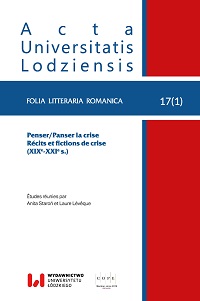Fiction (post-)apocalyptique et usages critiques de l’histoire : "Malevil" (1972) de Robert Merle
(Post)Apocalyptic Fiction and Critical Use of History: "Malevil" (1972) by Robert Merle
Author(s): Laure LÉVÊQUESubject(s): Literary Texts, Studies of Literature, Novel
Published by: Wydawnictwo Uniwersytetu Łódzkiego
Keywords: Merle (Robert); science fiction; post-apocalyptic (fiction); dystopia; (allegory of the) cave; history (meaning of)
Summary/Abstract: Under the deep impression of the 20th century’s worst excesses and sheer horror, Robert Merle, an engaged, humanist novelist, comes to question the humanity of man. As a popular novelist he imprints this reaction on fashionable genres, such as science fiction and dystopia, in which dolphins Fa and Bi are more informed than the humans (“An Animal Endowed with Reason/ The Day of the Dolphin” 1967), a species that is not really worth perpetuating (“The Protected Men/ The Virility Factor”, 1974). In 1972, in “Malevil”, Merle veers towards post-apocalyptic fiction, imagining a nuclear catastrophe that has brought man back to a primary condition; it is a situation that allows him to conceive of the political and moral crisis at the heart of the city. Beyond this classical revealing function, though, the crisis heuristics brings Merle face to face with the blind spots of his ideological reference, so that the text eventually puts in a crisis situation the very progressive positions exhibited by the author, curbing the text to the reactionary positions of a “Bajavel in Ravage/ Ashes”, “Ashes” (1943).
Journal: Acta Universitatis Lodziensis. Folia Litteraria Romanica
- Issue Year: 1/2022
- Issue No: 17
- Page Range: 231-243
- Page Count: 14
- Language: French

